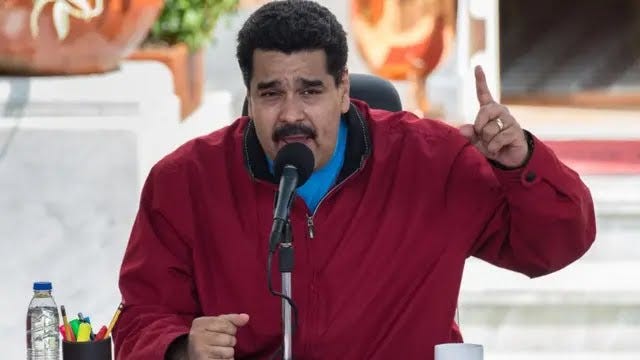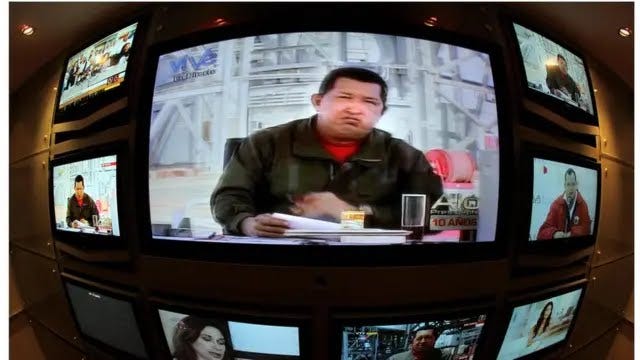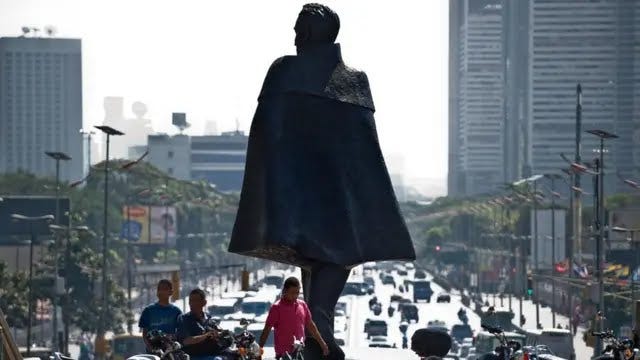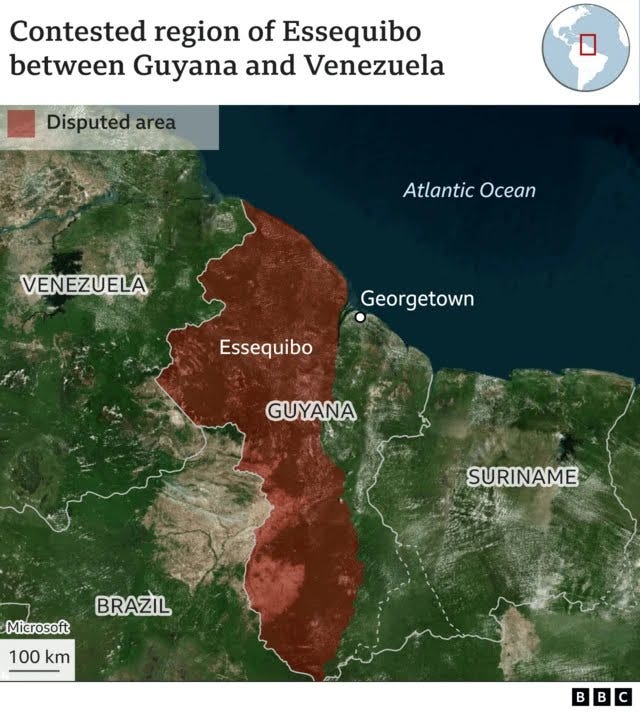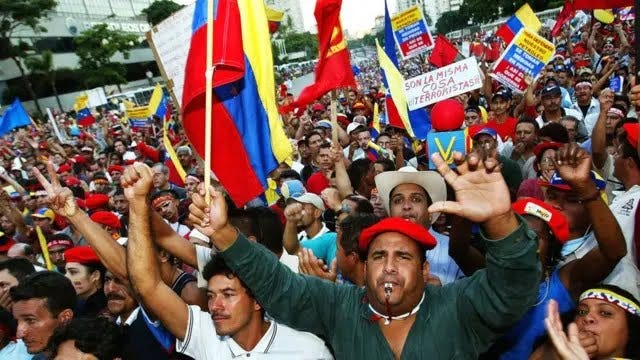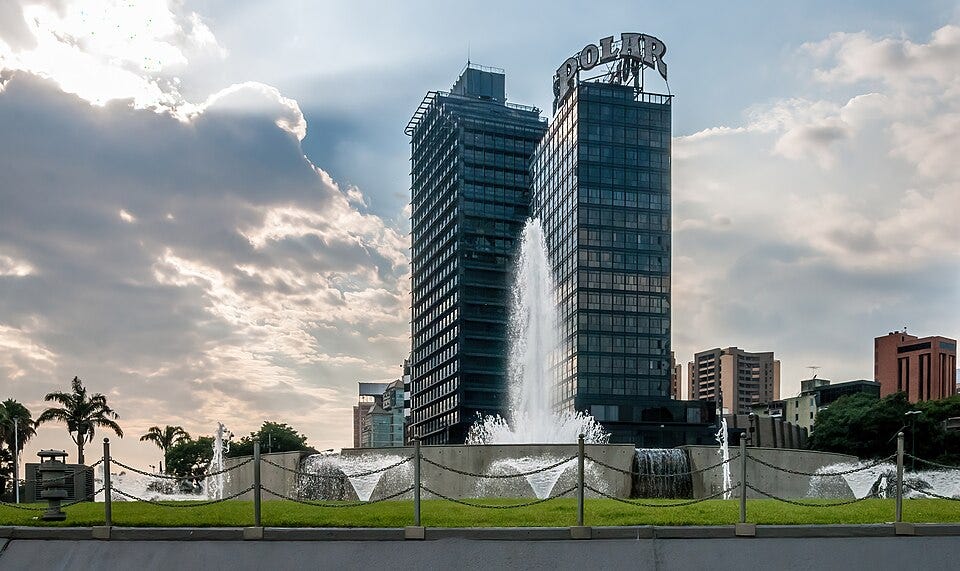Venezuela country profile
Venezuela's economy is heavily dependent on oil, facing significant challenges like hyperinflation, food shortages, and high unemployment.
Venezuela is one of the most highly-urbanised countries in Latin America. It has some of the world's largest proven oil deposits as well as huge quantities of coal, iron ore, bauxite and gold.
It has been one of the world's leading exporters of oil but the country experienced poor economic management in the early decades of the 21st Century.
Former president Hugo Chavez, who died in 2013, styled himself a champion of the poor during his 14 years in office, pouring billions of dollars of Venezuela's oil wealth into social programmes.
The government of his successor, Nicolas Maduro, has had to struggle with plummeting oil prices and an economic and political crisis that has left Venezuela in a state of near-collapse.
The country struggles with rampant inflation, goods shortages, unemployment and crime. Seven million Venezuelans have fled abroad to neighbouring states.
The country is involved in a long-running border dispute with neighbouring Guyana over Essequibo, a disputed oil-rich territory that Guyana, and British Guiana before it, have administered since 1899.
BOLIVARIAN REPUBLIC OF VENEZUELA: FACTS
Capital: Caracas
Area: 916,445 sq km
Population: 30.5 million
Languages: Spanish, plus regional languages
Life expectancy: 67 years (men) 76 years (women)
LEADERS
President: Nicolas Maduro
President Nicolas Maduro has governed since March 2013, following the death of his mentor Hugo Chavez.
He was declared the winner of the July 2024 presidential election by the government-controlled electoral commission, the National Electoral Council (CNE), which handed him a third consecutive term in office.
The opposition said its candidate, Edmundo González, was the real winner. González fled to Spain after the authorities issued a warrant for his arrest following the poll.
The US, the EU and the majority of foreign governments have refused to accept Mr Maduro as the winner without Caracas releasing detailed voting data to prove the result.
The result has been recognised by President Maduro's allies, including Russia, China and Iran.
After the last election in 2018 was widely dismissed as neither free nor fair, dozens of governments including the US recognised the then opposition leader Juan Guaido as the interim president and imposed heavy sanctions on Venezuela.
But this time, the US, UK and EU have stopped short of recognising Mr González as the president, despite US Secretary of State Anthony Blinken saying there is "overwhelming evidence" that he won, not President Maduro.
Instead, several foreign governments in the West have prioritised the so-called "Brazil approach" to try to negotiate a peaceful transition of power with Mr Maduro's government.
MEDIA
Venezuela's political polarisation is mirrored in the media.
State TV coverage routinely ignores the opposition. Critical and exile media operate online.
Many journalists have fled because of threats and physical dangers, says Reporters Without Borders.
The government and its opponents use social media as a battleground.
TIMELINE
Image caption,A statue of Latin American hero Simon Bolivar adorns one of the main avenues of central Caracas
Some key dates in Venezuela's history:
1498-99 - Christopher Columbus and Alonso de Ojeda visit Venezuela, which is inhabited by Carib, Arawak and Chibcha peoples.
1521 - Spanish colonisation begins.
1749 - First rebellion against Spanish colonial rule.
1810 - Venezuelans take advantage of Napoleon's invasion of Spain to declare independence.
1829-30 - Venezuela secedes from Gran Colombia.
1870-88 - Ruler Antonio Guzman Blanco attracts foreign investment, modernises infrastructure and develops agriculture and education.
1889 - Venezuela lays claims to two-thirds of Guyana west of the Essequibo river, but international arbitration rules in favour of Guyana in 1899.
1908-35 - Under dictator Juan Vicente Gomez, Venezuela becomes world's largest oil exporter.
1945 - Coup establishes civilian government after decades of military rule.
1948 - President Romulo Gallegos, Venezuela's first democratically-elected leader, overthrown within eight months in military coup led by Marcos Perez Jimenez.
1958 - Admiral Wolfgang Larrazabal ousts Marcos Perez Jimenez; leftist Romulo Betancourt of the Democratic Action Party (AD) wins presidential election.
1964 - Venezuela's first presidential handover from one civilian to another takes place when Raul Leoni is elected president.
1973 - Venezuela benefits from oil boom and its currency peaks against the US dollar; oil and steel industries nationalised.
1989 - Carlos Andres Perez elected president amid economic depression, launches austerity programme with IMF loan. Riots, martial law and general strike follow, with hundreds killed in street violence.
1992 - Colonel Hugo Chavez and supporters make two coup attempts. Some 120 people killed in suppression of coups, Col Chavez jailed for two years before being pardoned.
1998 - Hugo Chavez elected president amid disenchantment with established parties, launches the 'Bolivarian Revolution'. He adopts socialist and populist economic and social policies funded by high oil prices, and a vocal anti-US foreign policy.
2005 President Chavez brings in land reform to eliminate Venezuela's large estates and benefit rural poor. Ranchers say it is an attack on private property.
2006 - Venezuela signs a $3bn arms deal with Russia, moving away from US arms supplies. Chavez wins a third presidential election.
2012 - Government extends price controls on basic goods in the battle against inflation. Venezuela becomes a full member of regional trading bloc Mercosur. Chavez wins a fourth term in office.
2013 - Chavez dies at age 58 after a battle with cancer. His chosen successor Nicolas Maduro is narrowly elected president amid an imploding economy and a divided nation.
2018 - UN Secretary General Antonio Guterres chooses to have the International Court of Justice (ICJ) consider Venezuela's long-running claim that the 1899 ruling on the border between Venezuela and Guyana is invalid.
2019 - Opposition leader Juan Guaidó declares himself interim president, and asks military to oust President Maduro saying the 2018 election was rigged. EU, US and most Latin American countries recognise Mr Guaidó.
2020 - Opposition boycotts legislative elections, which are duly won by President Maduro's party and allies.
2023 - UN says more than seven million Venezuelans have fled the country.
The International Court of Justice rejects Venezuela's objections it is not the right body to rule on the long-running border dispute between Guyana and Venezuela over Essequibo and says it will now rule on the issue.
Venezuelans overwhelmingly back the country's claim to Essequibo in a referendum and approve establishing a new Venezuelan state in the area.
2024 - President Maduro is declared winner of a contested presidential election. The opposition says its candidate was the real winner.
Image caption,Rallies for and against President Hugo Chavez were a regular feature of his time in office
The BBC
Overview
Venezuela's economy is heavily dependent on oil, facing significant challenges like hyperinflation, food shortages, and high unemployment. The country's economy is characterized by corruption, mismanagement of the oil sector, and government control. Despite some recent growth, the economy continues to struggle with high levels of poverty and debt.
Key Characteristics and Challenges:
Oil Dependence: Venezuela is heavily reliant on oil exports, with the sector accounting for a significant portion of government revenues and foreign earnings.
Economic Mismanagement: The economy has been plagued by mismanagement, leading to hyperinflation, shortages, and a decline in living standards.
Hyperinflation: Venezuela has experienced hyperinflation, reaching a peak of over 130,000% in 2018, though it has since slowed.
Food Shortages: Widespread food shortages and high food prices have been a major concern for Venezuelans.
High Unemployment: Unemployment rates have risen significantly, contributing to poverty and social instability.
Corruption: Corruption is pervasive and hinders economic growth and development.
Sanctions: US sanctions have also had a significant impact on the Venezuelan economy.
Dollarization: While the bolivar is the official currency, there is a growing trend of dollarization, with US dollars increasingly used in transactions.
Public Debt: Venezuela has a significant public debt burden.
Poverty: A large portion of the population lives in poverty, with extreme poverty rates reaching historically high levels.
Economic Growth: While there have been some signs of economic growth in recent years, particularly in 2023, the economy remains fragile.
Economy of Venezuela
Article Talk
The economy of Venezuela is based primarily on petroleum, as the country holds the largest crude oil supply in the world. Venezuela was historically among the wealthiest economies in South America, particularly from the 1950s to 1980s. During the 21st century, under the leadership of socialist populist Hugo Chávez and his successor Nicolás Maduro, the Venezuelan economy has collapsed, prompting millions of citizens to flee Venezuela. GDP has fallen by 80 percent in less than a decade.The economy is characterized by corruption, food shortages, unemployment, mismanagement of the oil sector, and since 2014, hyperinflation. As of 2024, inflation has stabilized at 59.61%.
Economy of
Venezuela
Plaza Venezuela in Caracas
Currency
Bolívar Digital (VES)
Fiscal year
Calendar year
Trade organizations
WTO, OPEC, Unasur, ALBA
Country group
Upper-middle income country
Statistics
Population
Increase 28,301,696 (2022)
GDP
Increase $102.328 billion (nominal, 2024 est.)
Increase $224.526 billion (PPP, 2024 est.)
GDP rank
69th (nominal, 2024)
73rd (PPP, 2024)
GDP growth
Increase 4.0% (2023f)
GDP per capita
Increase $3,867 (nominal, 2024 est.)
Increase $8,486 (PPP, 2024 est.)
Source: Wikipedia




